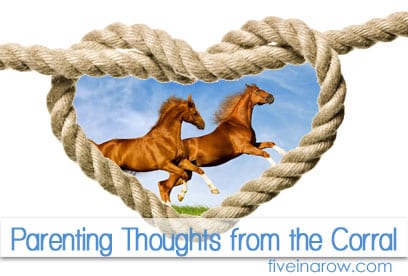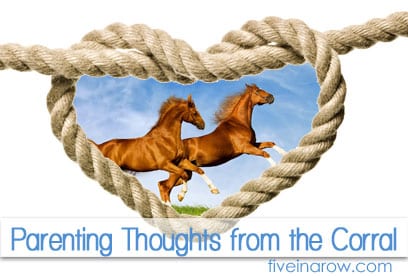Even though my focus of study has traditionally been on reading materials encouraging parents as they raise and teach their children, for the last six months I’ve found myself doing a lot of reading about horse training techniques. Through this study, I have discovered men and women horse owners and trainers whose number one rule is never get angry (or rather, never show anger or let it build) — and I must admit, this amazes me. If one of these trainers can’t accomplish something with their horse, or they take a spill, they don’t waste their time blaming or expressing anger with their horse, or using heavy handed methods to “teach their charge who’s boss.” Instead they just back off and quietly study the situation, trying to think of a new way to gain the horse’s trust and convince the horse to cooperate. They put their energy into trying to figure out what would help their horse understand what it needs to know to mature in its training.
While I do know that horses are not children, I seem to keep finding crossover wisdom for parents here. What if anger and irritation simply were not legal for us as parents –I mean if we just did not allow ourselves to get irritated and angry (I know, like in the PERFECT world!) We would probably achieve more with our children, and achieve it much more quickly. Parental anger seems to take us three steps back for each step we make forward with our young ones. After all our children are just that, children! That means they don’t know how to behave like adults. That is our job to slowly teach them the way to go. And some days that job really does go slowly!
 It seems these gentle horse trainers realize that anger just will not accomplish what they are after, so they don’t waste time becoming flustered by their horse’s behavior. That sounds like something some of us might want to work toward! I know I have a great deal of respect for the “slow to anger” horse trainers —in fact one of them, Pat Parelli, offers his wisdom when a horse is frustrating a trainer, and says that while the person working with the horse could just remove himself from the problem for a while and cool off, an easier solution is to “smile, whistle and ride.” He says that, “It is difficult to whistle when you are frowning, but easy when you are smiling and when you begin to whistle it just brings the smile back.” Perhaps as parents we could learn to do this more often–to smile and whistle while we train and bring up our children in a self-controlled, calm manner.
It seems these gentle horse trainers realize that anger just will not accomplish what they are after, so they don’t waste time becoming flustered by their horse’s behavior. That sounds like something some of us might want to work toward! I know I have a great deal of respect for the “slow to anger” horse trainers —in fact one of them, Pat Parelli, offers his wisdom when a horse is frustrating a trainer, and says that while the person working with the horse could just remove himself from the problem for a while and cool off, an easier solution is to “smile, whistle and ride.” He says that, “It is difficult to whistle when you are frowning, but easy when you are smiling and when you begin to whistle it just brings the smile back.” Perhaps as parents we could learn to do this more often–to smile and whistle while we train and bring up our children in a self-controlled, calm manner.
Maybe the reason these particular types of horse trainers can smile is because they have an utter and complete confidence that they will find a solution to the problem (or their horse’s particular behavior). They don’t feel rushed and frantic, or embarrassed…just confident.
But, I think above all these trainers desire a good, lasting relationship with their horse. It is for this reason, they are not quick to anger nor are they overly heavy handed, but rather confident that with these calmer methods they eventually will have a well trained horse as well as a horse that respects and trusts them. Such trainers aren’t at all surprised or embarrassed at some poor behavior in their animals, they just gently and quietly go about studying the situation and discovering a solution. And, for each horse it may be a different solution! These horse handlers don’t take “how their horse reacts” as a personal insult to them, because they know that training up a horse is a long process, one at which they will succeed if they stay consistent, gentle and firm. Instead they just continue reminding and helping the horse understand what is really being asked of him.
Finally I’ve seen over and over, throughout the study of gentle horse training techniques, the desire to preserve the integrity and honor of the horse. Rather than severe dominating and lording over the animal, or using angry punishments or humiliating and shaming their charges, these trainers want to learn to work with their horses in an attitude of mutual respect. By staying calm and gentle and using reasonable consequences (rather angry paybacks), the horse respects his trainer and begins to feel safe in such an environment. Likewise, the trainer respects his horse, and doesn’t forget to put his animal’s emotional and physical needs first. In fact, some of these trainers actually view their occupation as working on themselves while they gently train their horses. Now, isn’t that something that we as parents could pursue–the attitude that we, ourselves, are the ones who also need work as we are lovingly training our children? Wouldn’t this almost automatically create a relationship of true mutual respect? Parents and children both need to grow!
The Michigan trainer I’ve been working with this summer says that his favorite “child” technique when “those” situations arise, is to get real close to his children, get their full attention or focus. When up real close he’ll then whisper his request in a pleasant way! He says that gains him more obedience and cooperation than anything else. He also thinks a good wink now and then does wonders to keep kids loose and close to him, and more than once I’ve seen him give those smiles to his kids that any child would cherish. All perhaps good ideas to ponder, and implement as necessary!
The more I read about subject of gentle horse training, the more I see that many of the tenets of the method are effective not only for animal training, but for many people relationships as well. To make the discovery that one can accomplish goals without using a forcing, dominating behavior, without anger and undo irritation, but rather in the attitude of a strong servant leader and of mutual respect, can be a milestone in forming close, lasting relationships of all kinds!
Happy whispering, whistling and smiling while you ride out this magnificent journey of homeschooling!




 Becky Jane’s Cranberry Thanksgiving Week
Becky Jane’s Cranberry Thanksgiving Week
Thank you for this encouraging post! 🙂
Just what I needed!
I agree, this is encouraging to me. After another frustrating lesson with my son yesterday, he hopped up to instruct his sister, and thinking that this would help motivate her, I observed him grow in exasperation as she didn’t follow his instructions for long. Perhaps he learned something lesson on how not following instructions makes lessons impossible! We shall see…at 6 and 3 and one crawling around we have a long way to go and I have needed hope in this area of my own reaction when things aren’t going well. So thanks for that.
Beautiful post! Such a great parallel and words of wisdom!
I am a organic farmer/Mom/homeschooler. This is my busy season. My words have been clipped, towards my beautiful, bright three year old daughter today. I feel like that last little bit of butter being spread on burnt toast. Your post is just what this tired (near tears) Mama needed. It was like a big warm hug and piece of pie. So tomorrow I will get up and begin again! Calmer and sweeter. Thanks!
Thank you so much for posting this and honestly saying this is of course our ideal situation and we all are striving towards it!
The Lord is always on time. Very encouraging. Thank you.
I live in Michigan, and would love if you could share, the name of your trainer! I work with a wonderful woman by the name of Kim Cardeccia in Fenton, Michigan (http://www.hiddenpromisecampus.com). The philosophy sounds very familiar!
Very encouraged by all three parts of this series. I have a 7yr old, 2 yr old, and 8 Mon old. Some days are very difficult yet Gods design for sanctification through parenting is so beautiful and needed. I can never be encouraged enough in the area of gentleness. Thank you!
Thank you for this post. It speaks to me. I have always been quick to anger and this is something that I have been trying recently to work on. I love how you link this to horse trainers. It is so true. I have never seen them react in anger or frustration (at least in front of the horse!) and I’ve seen some dangerous horses calm and respond to this approach. I will be thinking of this peaceful attitude daily now as I relate to my children.
This is something I should read daily, I struggle with being short tempered yet it’s what I disliked about my dad growing up. Thank you for this wonderful advice.